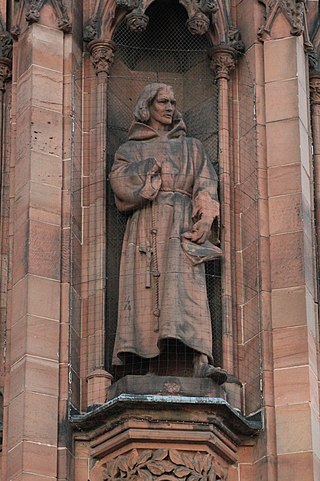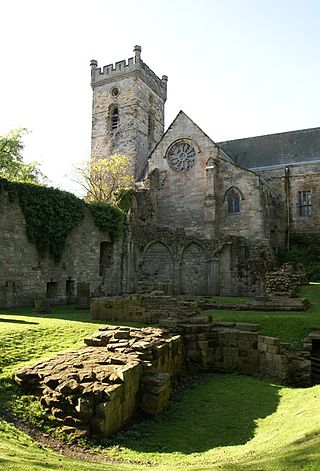Related Research Articles

James Macpherson was a Scottish writer, poet, literary collector, and politician. He is known for the Ossian cycle of epic poems, which he claimed to have discovered and translated from Gaelic.

William Dunbar was a Scottish makar, or court poet, active in the late fifteenth and early sixteenth centuries. He was closely associated with the court of King James IV and produced a large body of work in Scots distinguished by its great variation in themes and literary styles. He was probably a native of East Lothian, as assumed from a satirical reference in The Flyting of Dumbar and Kennedie. His surname is also spelt Dumbar.

Clan Mackay is an ancient and once-powerful Highland Scottish clan from the far North of the Scottish Highlands, but with roots in the old Kingdom of Moray. They supported Robert the Bruce during the Wars of Scottish Independence in the 14th century. In the centuries that followed they were anti-Jacobite. The territory of the Clan Mackay consisted of the parishes of Farr, Tongue, Durness and Eddrachillis, and was known as Strathnaver, in the north-west of the county of Sutherland. However, it was not until 1829 that Strathnaver was considered part of Sutherland when the chief sold his lands to the Earls of Sutherland and the Highland Clearances then had dire consequences for the clan. In the 17th century the Mackay chief's territory had extended to the east to include the parish of Reay in the west of the neighbouring county of Caithness. The chief of the clan is Lord Reay and the lands of Strathnaver later became known as the Reay Country.
Pibroch, piobaireachd or ceòl mòr is an art music genre associated primarily with the Scottish Highlands that is characterised by extended compositions with a melodic theme and elaborate formal variations. Strictly meaning 'piping' in Scottish Gaelic, piobaireachd has for some four centuries been music of the great Highland bagpipe.

Jacqueline Margaret Kay,, is a Scottish poet, playwright, and novelist, known for her works Other Lovers (1993), Trumpet (1998) and Red Dust Road (2011). Kay has won many awards, including the Somerset Maugham Award in 1994, the Guardian Fiction Prize in 1998 and the Scottish Mortgage Investment Trust Book of the Year Award in 2011.

Clan Sutherland also known as House of Sutherland is a Highland Scottish clan whose traditional territory is the shire of Sutherland in the far north of Scotland. The chief of the clan was also the powerful Earl of Sutherland, however in the early 16th century this title passed through marriage to a younger son of the chief of Clan Gordon. The current chief is Alistair Sutherland who holds the title Earl of Sutherland.

Elizabeth Melville, Lady Culross (c.1578–c.1640) was a Scottish poet.
Donald Mackay, 1st Lord Reay, 14th of Strathnaver was a Scottish soldier and member of Parliament. He played a prominent role in the Thirty Years' War, raising a regiment of 3,000 men, which served in both the Danish and Swedish forces. He was later an unwilling Covenanter. He was the fourteenth chief of Clan Mackay, a Highland Scottish clan.

Clan Mackie is a Lowland Scottish clan. The clan does not have a chief recognised by the Lord Lyon King of Arms therefore the clan has no standing under Scots Law. Clan Mackie is considered an armigerous clan, meaning that it is considered to have had at one time a recognised chief, or a chief who possessed the chiefly arms of the name; however, no one at present is in possession of such arms.

Jean Gordon, Countess of Bothwell was a wealthy Scottish noblewoman and the second wife of James Hepburn, 4th Earl of Bothwell. He became, after his divorce from Lady Jean, the third husband of Mary, Queen of Scots. Lady Jean herself had a total of three husbands. Upon her second marriage, she became the Countess of Sutherland.

The Battle of Leckmelm was a Scottish clan battle that took place in 1586, in the Scottish Highlands. It was fought between the Clan Gunn against the Clan Sutherland, Mackays of Aberach and the MacLeods of Assynt.
Scottish Gaelic literature refers to literary works composed in the Scottish Gaelic language, which is, like Irish and Manx, a member of the Goidelic branch of Celtic languages. Gaelic literature was also composed in Gàidhealtachd communities throughout the global Scottish diaspora where the language has been and is still spoken.
Events from the year 1943 in Scotland.
Events from the year 1929 in Scotland.

Poetry of Scotland includes all forms of verse written in Brythonic, Latin, Scottish Gaelic, Scots, French, English and Esperanto and any language in which poetry has been written within the boundaries of modern Scotland, or by Scottish people.
Events from the year 1812 in Scotland.
Events from the year 1813 in Scotland.

The Mackays of Scoury were a minor noble Scottish family and a branch of the ancient Clan Mackay, a Highland Scottish clan. They were seated at Scourie Castle, in Scourie, in the parish of Eddrachillis, county of Sutherland. However, Scourie was part of the Mackay chief's province of “Strathnaver” until it was sold to the Earl of Sutherland in 1829.
Lady Lilias Grant was a Scottish letter-writer and matriarch of the Grant clan of Freuchie.
Anne Livingstone, Countess of Eglinton was a Scottish courtier and aristocrat, and lady-in-waiting to Princess Elizabeth and Anne of Denmark.
References
- ↑ The biographical dictionary of Scottish women : from the earliest times to 2004. Ewan, Elizabeth., Innes, Sue., Reynolds, Sian. Edinburgh: Edinburgh University Press. 2006. ISBN 9780748626601. OCLC 367680960.
{{cite book}}: CS1 maint: others (link) - ↑ Fraser, James (1905). Chronicles of the Frasers: The Wardlaw Manuscripts Entitled, Polichronicon Seu Policratica Temyorum, Or, the True Genealogy of the Frasers 916-1674 (PDF).